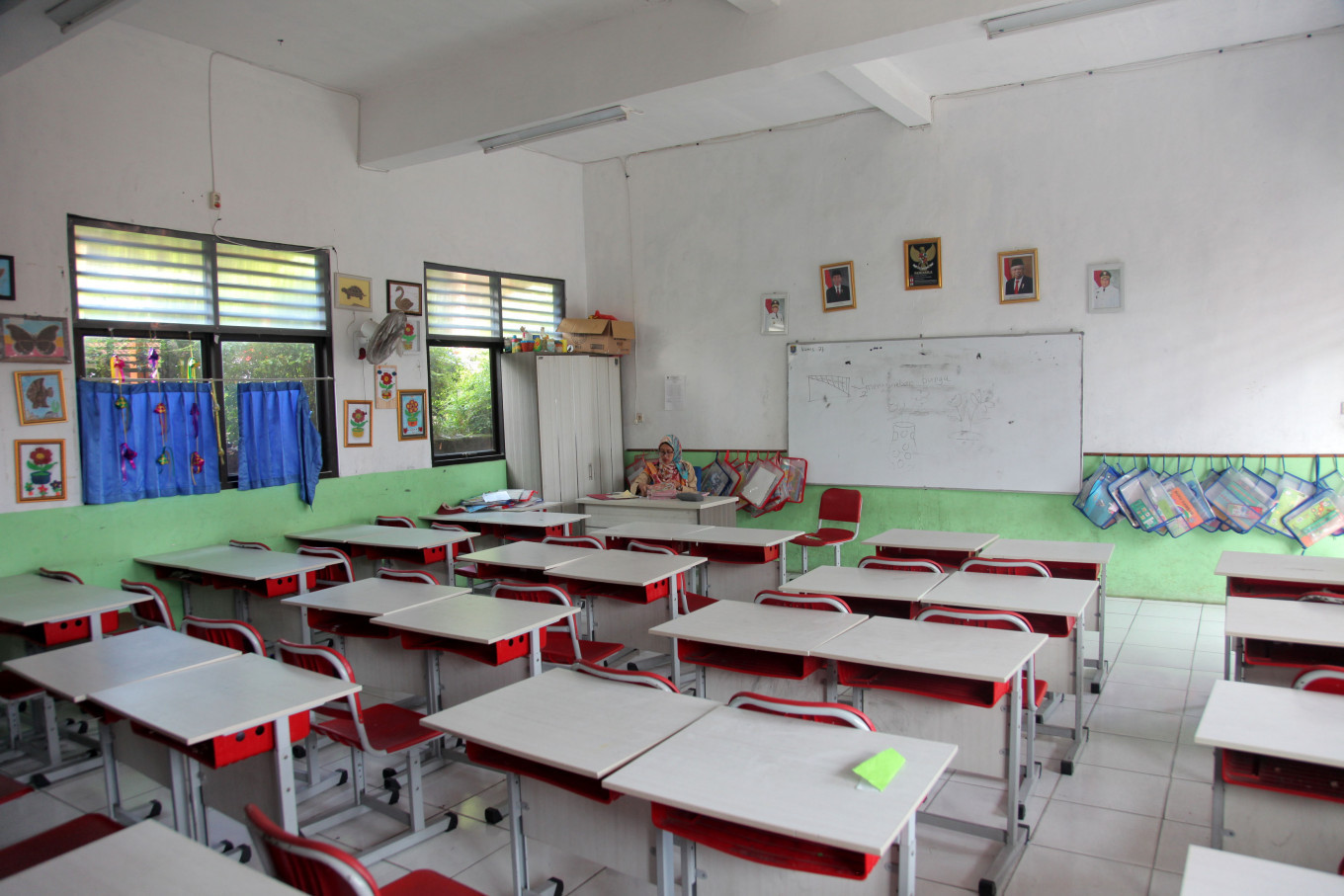Tips for passing school at home with flying colors
Over 60 million students in the country are temporarily out of school due to the pandemic, having their education affected in unprecedented ways.
Change Size
 An empty classroom is seen at SD Depok Baru state elementary school classroom, Depok, West Java, on March 16. (JP/Riand Alfiandy)
An empty classroom is seen at SD Depok Baru state elementary school classroom, Depok, West Java, on March 16. (JP/Riand Alfiandy)
The COVID-19 outbreak has undoubtedly created disruption in school activities.
In Indonesia, the government has closed schools since March. According to UNICEF, over 60 million students in the country are temporarily out of school due to the pandemic, having their education affected in unprecedented ways.
Those who can afford internet access and personal computers have had to adapt to online learning.
Jakarta-resident Cecilia Felicia, a mother of two, said that her 10-year-old was not fond of the idea of school at home, saying that her son associated home as a place to play, not to do school assignments.
Cecilia shared that her son did not complete his school assignments in the beginning of the online learning program, as he felt that he was on holiday.
As a stay-at-home mother who also sells handicrafts during her free time, she found it was challenging to manage her schedules, as she needed to accompany her son studying while also doing her own work.
Months have passed and school at home is still considered the best approach to educating children while protecting them during the pandemic.
As the 2020-2021 school year started in mid-July, schools have readjusted the online learning process.
Cecilia, whose sons study in a Catholic school in West Jakarta, told The Jakarta Post that the rules were clearer and teachers knew what to do, making it easier for her and her sons to adapt to the "new normal" education.
Private schools, such as Green Montessori School and Sampoerna Academy, have also shifted their offline classes to virtual learning.
Green Montessori School director Nourma Bachtiar acknowledged that the current situation was not ideal and inconvenient for many. She tried to combine expectations of parents and teachers with the school's philosophies and core values.
Following the Montessori education, which focuses on preparing children for the “real world”, Nourma said that Green Montessori School encouraged students to adapt and always do their best in any situation.
“It does not matter if it’s online or offline learning, during a pandemic or not,” she said.
Meanwhile, Sampoerna Academy said in a statement that the school’s virtual learning program was designed to sharpen the student’s 5C skills, namely critical thinking, communication, collaboration, creativity and character.
The education materials are said to involve discussion, problem solving and case study analysis.
With schools having done their part, Nourma said that parents also needed to be proactive in distance learning, as its success lay in the hands of both school and parents.
Nourma suggested parents take part in discussions, WhatsApp groups and programs provided by the school to keep them updated with their children’s activities.
Moreover, she also recommended parents learn the stages of child development, explaining that it could help parents to focus on specific areas or skills to be developed according to the child’s age.
Regarding the 5C skills adhered to by Sampoerna Academy, psychologist Jovita Maria Ferliana suggested two-way communications between parents and children.
Jovita recommended parents make the time to discuss the latest topics or trends with their children.
“[Have] a daily discussion [with your child] for around 30 to 60 minutes. Ask them to actively participate in a discussion to find out what’s going on around them,” she said, adding that parents could also share their daily activities and ask the child’s opinion about them.
“Sometimes, ask a child to pick a new game or change the game rules to develop their creativity,” she said.
Jovita also recommended that parents allow sufficient break time for a child or use apps, such as TikTok and Instagram Live, to let children connect with their school friends outside virtual learning time.
Read also: Challenges of home learning during a pandemic through the eyes of a student
The screen time conundrum
Since most people are staying indoors, the internet has become a window on the outside world and this can result in increased screen time for child.
In a virtual workshop hosted by video-streaming application Netflix, Parentalk.id founder Nucha Bachri said that increased screen time caused bad posture among children as they tended to bend down while they used gadgets.
The increased screen time also creates another dilemma for parents. As they are busy working from home, they might be unaware about the content their children consume.
Communications and Information Ministry director of information application management Mariam F Barata said that the current situation actually provided the public with the opportunity to improve their digital literacy, particularly for children as users and parent as guardians.
However, Mariam also highlighted that parents had to be a good digital role model for their children.
With this in mind, Family Online Safety Institute (FOSI) founder and CEO Stephen Balkam shared seven steps to becoming a good digital role model.
Among the steps is communication with children. “Talk to them early, because younger and younger children are going online. We need to prepare them for what they may see [on the internet],” said Balkam.
He also said that some applications, such as Netflix, were equipped with a parental control feature, which helped to filter out inappropriate content for children.
Balkam also urged parents to be good digital role models.
“One of the biggest complaints we get from children is they can’t get their parents’ attention,” he said, adding that children would copy what their parents do, making it important for parents to know when to put their gadgets away. (wng)









